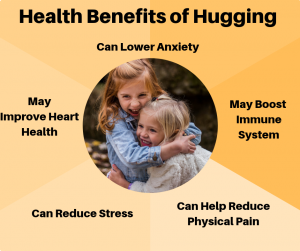Hugging as a medicine- the power of touch, is often touted as a good way to solve a problem. Of course, hugs can help in many situations, from showing appreciation to beating loneliness and stress at work.


Our skin is our security system, our sensations detector and our gateway to the world around us. Touch is the very first sense we develop in the human embryo– less than eight weeks after being conceived, an embryo is barely 2.5 centimetres long and has neither eyes nor ears, but its skin is already highly developed.
“Hugging it out” is often touted as a good way to solve a problem. Of course, hugs can help in many situations, from showing appreciation to beating loneliness and stress at work.
The science behind why touch feels good!
The slow stroking involved in grooming stimulates a particular set of nerves – the afferent c-tactile neurons that are found only in hairy skin and are quite different to the usual nerves that convey information about touch, pain and pressure. These neurons respond only to light and slow stroking. They have a direct route into the brain, where they trigger the release of endorphins. Touch releases special hormones in our bodies and also inhibits stress hormones. Specifically, the right kind of touch can:
- Increases oxytocin—this hormone is great for our heart and makes us feel connected to the world around us.
- Drops cortisol—the stress hormone which makes us feel anxious and decreases our cognitive function.
- Triggers dopamine—the pleasure hormone which makes us feel really, really good.
The Science behind hug
When you see someone you have not been around in a long time, when someone is celebrating exciting news, or when someone is having a hard time, it is normal to give them a hug. It is a gesture that sends a specific message depending on the occasion. It can show people just how much you love them, how sorry you feel, or how much you care about them.


Hugging is an important way for many to express how they are feeling to someone else. If you were to ask someone why they hug or why they like being hugged, they might tell you something along the lines of, “it feels right.” While hugging does tap into your emotions and even elicit an emotional response, there is more science to hugging than you might realize.
Hormones & hugging
There are hormones released when you hug someone that can provide significant health benefits. Skin-to-skin contact can send signals to nerves in the area of the brain that is responsible for managing blood pressure. When you receive a hug, it can lower your blood pressure, helping you feel relaxed.
Hugging also release dopamine which results in people “feeling good” or feeling a sense of reward. Dopamine is responsible for the “highs” people get after exercising, eating your favourite meal, or having sex. Even simply hugging someone in a non-sexual way can release dopamine in your brain and help you feel good.
Physical touch, including hugging, also releases a chemical called oxytocin or what some call “the love hormone.” When people connect physically with someone they love, this hormone is released and helps them feel good. It helps increase bonding, empathy, and positive thinking. Oxytocin can have positive impacts on physical health like fighting infections and boosting your immune system.


Emotions & hugging
In general, hugging can have significant impacts on emotional health as well. The hormones involved can aid in this process as well. People who hug tend to feel a reduction in stress due to feeling loved and more secure. It also is a way people feel connected. Whether it leads to other forms of physical intimacy or not, a simple hug can increase bonding between people.
Hugging can also decrease emotions associated with depression. It can help people fight a sense of fear, isolation, and loneliness. It also can provide a self-esteem boost which aids in fighting symptoms of depression as well.
Importance of hugging your child
The importance of hugging your child cannot be underestimated. Hugging provides many benefits to people, but is particularly important in child development. Benefits of hugging and the science behind hugs
- Hugs help kids grow smarter
- Hugs help kids grow
Studies show that hugging can instantly boost the level of oxytocin. When oxytocin is increased, several growth hormones, such as insulin-like growth factor-I (IGF-1) and nerve growth factor (NGF), are increased as well10. As a result, the nurturing touch of a hug enhances a child’s growth.
- Hugs keep kids healthy
- Hugs stop temper tantrums
- Hugs build resilience
- Hugs make happy kids
- Hugs help child and parents bond
Final thoughts
Hugging has all kinds of benefits. But body autonomy is also important. Teaching kids how to kindly refuse a hug and handle uncomfortable situations is a good lesson for the child, too. Basically, a good hug is the fastest way for you to get oxytocin flowing in your body. Oxytocin, also known as the “love drug”, calms your nervous system and boosts positive emotions. Here’s how a good hug resulting in oxytocin flow affects you.


Dr.Nandhini V. Mohan & Dr Venkataramana Hegde
Veda wellness center
Nisarga Mane Sirsi
Uttarakannada District
Ph: 9597019032/ 9448729434
Email : nisargamane6@gmail.com












